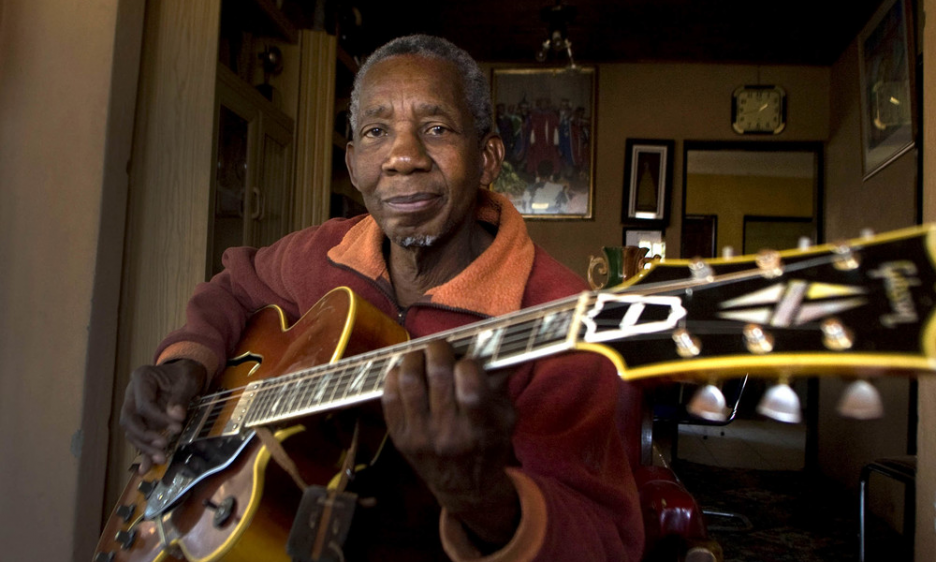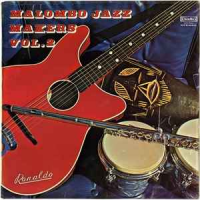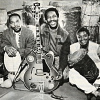Home » Jazz Articles » Multiple Reviews » Long-Lost Paradigm-Shifting LPs By South Africa's Malomb...
Long-Lost Paradigm-Shifting LPs By South Africa's Malombo Jazz Reissued

All the heavy cats in mainstream jazz found themselves reeling. The debut of Malombo had a devastating effect, and was the forerunner of a musical awakening among black South African musicians. It was the predecessor of the black-consciousness philosophy.
—The Star, South Africa
It is, in 2023, so commonplace for musicians to embrace their cultural heritage in their music that it is easy to forget that this has not always been so. In South Africa, for instance, in the 1950s, during the early years of the country's indigenous jazz movement, Black musicians looked exclusively towards the US for inspiration.
The strength of this US-centric cultural pull has been well documented. For example: In 1951, the British journalist Anthony Sampson moved to South Africa, where for four years he was the editor of Drum magazine, the equivalent of Ebony in the US. In a 1955 article for Drum, Sampson noted the attraction of African American jazz for Black South African musicians and audiences, rising as it did above government-imposed divisions of tribe and ethnicity (put in place to foster the strategy of divide and rule). In the piece, Sampson, who in 1964 helped Nelson Mandela write the defiant "I am prepared to die" speech he delivered at the infamous Rivonia Trial, quoted a Black townsman thus: "Tribal music! Tribal history! Chiefs! We don't care about chiefs! Give us jazz and film stars, man! We want Duke Ellington, Satchmo and hot dames! Yes, brother, anything American. You can cut out all this junk about kraals and folk tales and Basutos in blankets—forget it! You're just trying to keep us backward, that's what!"
A decade later, everything changed. In 1964, at South Africa's Castle Jazz Festival, shortly after the Rivonia judges sentenced Mandela, already jailed, to a further 26 years in prison, Malombo blew every other band offstage with an utterly Black South African style of jazz, one inspired by the folk music of the Venda people in the north east of the country. Against all expectations, the group took the coveted First Prize and won a recording deal with the Johannesburg-based Gallotone label. Malombo Jazz and Malombo Jazz Makers Vol. 2 were the result.
In 1981, looking back on the 1964 event, the South African Star newspaper said: "All the clevers and 'moggos' from Pimville, Sophiatown, western Native Township and Alexandria, who prided themselves as heavy cats in mainstream jazz, found themselves reeling from music with a natural rhythm. The debut of Malombo had a devastating effect, and was the forerunner of a musical awakening among black musicians. It was in a sense the predecessor of the black-consciousness philosophy."
In 1982, reporter Mbulelo Vizikhunga Mzamane wrote that Malombo's breakthrough signalled "a cultural reawakening, an end to the period of mourning of the ravages of [the 1960] Sharpeville [massacre]."
 Malombo Jazz
Malombo Jazz Malombo Jazz
Gallotone/Strut
1966/2023
Malombo were founded in the early 1960s by guitarist and leader Philip Tabane (pictured above), drummer Sebothane Julian Bahula and flautist Abe Cindi. This was the line-up which appeared at the 1964 Castle Jazz festival. By the time Malombo Jazz was recorded, however, Tabane had left the band. He was replaced by guitarist Lucky Ranku, while Abe Cindi took over as composer.
The album applies lyrical, at times lilting, guitar and flute melodies to a percussion sound steeped in rural Venda culture. The main instrument, the malombo drums, carved from the roots of the baobab tree and draped with cowhide, are traditionally used to communicate with ancestral spirits, as a way of healing the sick.
Malombo owed at least some of its existence to chance. In 1975, Julian Bahula, who had moved to London in 1973, described how he came across a set of traditional drums in a Pretoria market. "The next day I sold my kit drums and since then I've always used my people's traditional drums" (interview with Chris May for Black Music magazine).
 Malombo Jazz Makers
Malombo Jazz Makers Vol. 2
Gallotone/Strut
1967/2023
Malombo's second album continues along the same trajectory as the first. It is healing, contemplative music, designed for listening, not dancing.
Changes in personnel barely effected the sound. Whether in the lineup on Malombo Jazz and Malombo Jazz Makers Vol. 2, or as played by the lineups Tabane continued to lead prior to his passing in 2018, the style draws on jazz, but as Tabane said to writer Chris Stapleton in 1986, it remained rooted in traditional culture. "Why imitate the Americans?" asked Tabane. "All they're doing is trying to find their own roots... and those roots are right here in Africa. There is enough talent in us to play our own rhythm without polluting it with foreign material" (interview for Chris May and Chris Stapleton's African All-Stars, Quartet Books, 1987).
In 2023, South African jazz is secure enough in its own authenticity to once more tap directly into classic American jazz without risking self-harm. Drummer Asher Gamedze's highly recommended quartet album Turbulence And Pulse (International Anthem/Mushroom Hour, 2023) resonates almost without mediation with albums such as Charles Mingus' Charles Mingus Presents Charles Mingus (Candid, 1960) and contemporaneous releases by Art Blakey and The Jazz Messengers.
Tracks and Personnel
Malombo JazzTracks: Abbey's Wood; Lullaby For Angels; Grab This For Me; Emakhaya; Blues After Lunch; Bababelo; Intandane; A Tribute To Birds; Root Of Africa; Yuma Mbari; Lousy Fever; Jikeleza.
Personnel: Abbey Cindi: flute, vocals; Lucky Ranku: guitar; Julian Bahula: drums; Hilda Tloubatia: vocals (12).
Vol. 2
Tracks: Ngivulele; Udondolo; Soul Of Africa; Jolly Journey; Umk Hosi; Majazana; Abbey's Body; Vukani; Hleziphi; Sibathathu; Malombi Walk; Emoubane.
Personnel: Abbey Cindi: flute, vocals; Lucky Ranku: guitar; Julian Bahula: drums; Hilda Tloubatia: vocals.
< Previous
All About Jazz Organ: Inside the Hamm...
Next >
Your Requests
Comments
About Malombo
Instrument: Band / ensemble / orchestra
Related Articles | Concerts | Albums | Photos | Similar ToTags
Multiple Reviews
Malombo
Chris May
duke ellington
Philip Tabane
Julian Bahula
Abe Cindi
Lucky Ranku
Charles Mingus
Asher Gamedze
Art Blakey
The Jazz Messengers
For the Love of Jazz
 All About Jazz has been a pillar of jazz since 1995, championing it as an art form and, more importantly, supporting the musicians who create it. Our enduring commitment has made "AAJ" one of the most culturally important websites of its kind, read by hundreds of thousands of fans, musicians and industry figures every month.
All About Jazz has been a pillar of jazz since 1995, championing it as an art form and, more importantly, supporting the musicians who create it. Our enduring commitment has made "AAJ" one of the most culturally important websites of its kind, read by hundreds of thousands of fans, musicians and industry figures every month.



















